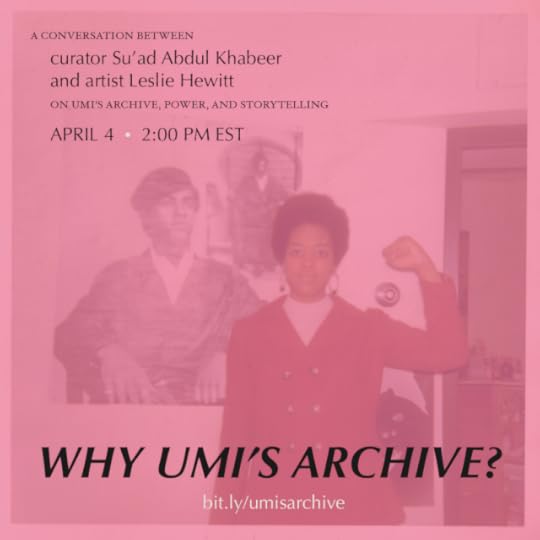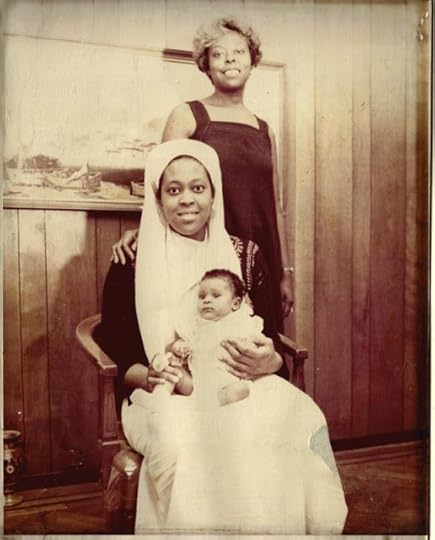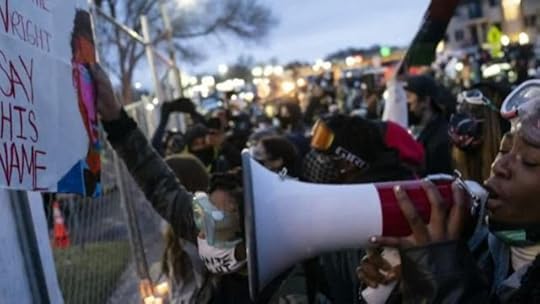Mark Anthony Neal's Blog, page 229
April 17, 2021
Exterminate All the Brutes (2021): Official Trailer

"The past has a future we never expect. Exterminate All the Brutes is a four-part HBO documentary series from filmmaker Raoul Peck that challenges how history is being written."
“The Talk” That Every Black Family Has About Police

"Because Black people are disproportionately targeted by police, many parents are forced to have “The Talk” with their young children about how to best navigate this tragic reality." -- The Daily Show with Trevor Noah
April 16, 2021
Umi’s Archive: On Power Archives and Our Stories: A Conversation with Curator Su'ad Abdul Khabeer and Artist Leslie Hewitt

Scholar-activist-artist, Dr. Su’ad Abdul Khabeer examines the intersections of official history and the untold stories of Black Americans, especially Black women and Black Muslims through the lens of her mother’s life in her newest project, Umi’s Archive. The project, a six-part online exhibition series, launched with a conversation on “power in archives and our stories” between Dr. Su’ad and noted visual artist Leslie Hewitt.
@font-face {font-family:Helvetica; panose-1:0 0 0 0 0 0 0 0 0 0; mso-font-charset:0; mso-generic-font-family:auto; mso-font-pitch:variable; mso-font-signature:-536870145 1342208091 0 0 415 0;}@font-face {font-family:"Cambria Math"; panose-1:2 4 5 3 5 4 6 3 2 4; mso-font-charset:0; mso-generic-font-family:roman; mso-font-pitch:variable; mso-font-signature:3 0 0 0 1 0;}@font-face {font-family:Calibri; panose-1:2 15 5 2 2 2 4 3 2 4; mso-font-charset:0; mso-generic-font-family:swiss; mso-font-pitch:variable; mso-font-signature:-536859905 -1073732485 9 0 511 0;}p.MsoNormal, li.MsoNormal, div.MsoNormal {mso-style-unhide:no; mso-style-qformat:yes; mso-style-parent:""; margin:0in; mso-pagination:widow-orphan; font-size:12.0pt; font-family:"Calibri",sans-serif; mso-ascii-font-family:Calibri; mso-ascii-theme-font:minor-latin; mso-fareast-font-family:Calibri; mso-fareast-theme-font:minor-latin; mso-hansi-font-family:Calibri; mso-hansi-theme-font:minor-latin; mso-bidi-font-family:"Times New Roman"; mso-bidi-theme-font:minor-bidi;}.MsoChpDefault {mso-style-type:export-only; mso-default-props:yes; font-family:"Calibri",sans-serif; mso-ascii-font-family:Calibri; mso-ascii-theme-font:minor-latin; mso-fareast-font-family:Calibri; mso-fareast-theme-font:minor-latin; mso-hansi-font-family:Calibri; mso-hansi-theme-font:minor-latin; mso-bidi-font-family:"Times New Roman"; mso-bidi-theme-font:minor-bidi;}div.WordSection1 {page:WordSection1;}
'Umi’s Archive: One Life, Many Stories' by Su’ad Abdul Khabeer
 Umi's Archive, Su’ad Abdul Khabeer @font-face {font-family:Helvetica; panose-1:0 0 0 0 0 0 0 0 0 0; mso-font-charset:0; mso-generic-font-family:auto; mso-font-pitch:variable; mso-font-signature:-536870145 1342208091 0 0 415 0;}@font-face {font-family:"Cambria Math"; panose-1:2 4 5 3 5 4 6 3 2 4; mso-font-charset:0; mso-generic-font-family:roman; mso-font-pitch:variable; mso-font-signature:3 0 0 0 1 0;}@font-face {font-family:Calibri; panose-1:2 15 5 2 2 2 4 3 2 4; mso-font-charset:0; mso-generic-font-family:swiss; mso-font-pitch:variable; mso-font-signature:-536859905 -1073732485 9 0 511 0;}p.MsoNormal, li.MsoNormal, div.MsoNormal {mso-style-unhide:no; mso-style-qformat:yes; mso-style-parent:""; margin:0in; mso-pagination:widow-orphan; font-size:12.0pt; font-family:"Calibri",sans-serif; mso-ascii-font-family:Calibri; mso-ascii-theme-font:minor-latin; mso-fareast-font-family:Calibri; mso-fareast-theme-font:minor-latin; mso-hansi-font-family:Calibri; mso-hansi-theme-font:minor-latin; mso-bidi-font-family:"Times New Roman"; mso-bidi-theme-font:minor-bidi;}.MsoChpDefault {mso-style-type:export-only; mso-default-props:yes; font-family:"Calibri",sans-serif; mso-ascii-font-family:Calibri; mso-ascii-theme-font:minor-latin; mso-fareast-font-family:Calibri; mso-fareast-theme-font:minor-latin; mso-hansi-font-family:Calibri; mso-hansi-theme-font:minor-latin; mso-bidi-font-family:"Times New Roman"; mso-bidi-theme-font:minor-bidi;}div.WordSection1 {page:WordSection1;}
Umi's Archive, Su’ad Abdul Khabeer @font-face {font-family:Helvetica; panose-1:0 0 0 0 0 0 0 0 0 0; mso-font-charset:0; mso-generic-font-family:auto; mso-font-pitch:variable; mso-font-signature:-536870145 1342208091 0 0 415 0;}@font-face {font-family:"Cambria Math"; panose-1:2 4 5 3 5 4 6 3 2 4; mso-font-charset:0; mso-generic-font-family:roman; mso-font-pitch:variable; mso-font-signature:3 0 0 0 1 0;}@font-face {font-family:Calibri; panose-1:2 15 5 2 2 2 4 3 2 4; mso-font-charset:0; mso-generic-font-family:swiss; mso-font-pitch:variable; mso-font-signature:-536859905 -1073732485 9 0 511 0;}p.MsoNormal, li.MsoNormal, div.MsoNormal {mso-style-unhide:no; mso-style-qformat:yes; mso-style-parent:""; margin:0in; mso-pagination:widow-orphan; font-size:12.0pt; font-family:"Calibri",sans-serif; mso-ascii-font-family:Calibri; mso-ascii-theme-font:minor-latin; mso-fareast-font-family:Calibri; mso-fareast-theme-font:minor-latin; mso-hansi-font-family:Calibri; mso-hansi-theme-font:minor-latin; mso-bidi-font-family:"Times New Roman"; mso-bidi-theme-font:minor-bidi;}.MsoChpDefault {mso-style-type:export-only; mso-default-props:yes; font-family:"Calibri",sans-serif; mso-ascii-font-family:Calibri; mso-ascii-theme-font:minor-latin; mso-fareast-font-family:Calibri; mso-fareast-theme-font:minor-latin; mso-hansi-font-family:Calibri; mso-hansi-theme-font:minor-latin; mso-bidi-font-family:"Times New Roman"; mso-bidi-theme-font:minor-bidi;}div.WordSection1 {page:WordSection1;}
Umi’s Archive: One Life, Many Stories
by Su’ad Abdul Khabeer | @DrSuad | special to NewBlackMan (in Exile)
In October of 2017, high off the success of my very first book, Muslim Cool: race, religion, and hip hop in the United States, I was preparing for my next project that would keep me thinking about Blackness and Black culture, but moving more transnationally, digging even deeper into questions of power. It would take me back to my hometown, Brooklyn, where I would look at hip hop again focusing on its role in the power plays of gentrification and to Black expatriates in the Middle East who navigate the power and the perils of the “blue passport.”
Then the unimaginable happened. My mother died. Three days before, I had been home giving talks on Muslim Cool and suggested that she, still grieving after the death of her own mother five months earlier, could join me on my first “official” field trip abroad. And then out of nowhere, a mere few hours after I called her to finalize our plan, Amina Amatul Haqq neè Audrey Weeks was gone.
That changed everything. As the oldest of my mother's two girls duty called and that meant going through my mother's things and deciding what to do with them. I knew my mother was the kind of person who did interesting things in her life. But she wasn’t the type to sit you down with stories, rather she would just drop historical jewels in casual conversation. Like the time she mentioned she was given her shahadah (testimony of faith) by one of Malcolm X’s former bodyguards. Or once, when driving with her through Jamaica Queens, she mentioned how she helped organize an economic boycott after the NYPD killed ten-year-old Clifford Glover. At the same time, she protested against apartheid for African Liberation Day in Washington DC in 1972.
So I wasn't surprised to discover treasures. As I went through her papers and belongings, I found so many things that spoke to so many stories of her life, but also of the African diaspora. My mother’s belongings show her roots as the granddaughter of Caribbean migrants to Harlem in the early 1900s and a Black public school student in the Jim and Jane Crow North. They tell stories of her activism as a college student in the Black Power movement, stories of Black women's heartache seen in her quest to find “my own Malcolm,” as she wrote to a friend, and stories of faith as liberation, to name a few.
My mother was an everyday person. She was a public school teacher and single parent who lived a remarkable life. Likewise, her personal collection is full of the extraordinary and ordinary, such as a photo of Sidney Poitier at a family dinner, pictures of her father as soldier during WWII in Iran and the Indian Subcontinent posing with locals he called friends and allies, a first-edition autographed copy of Angela Davis’ Women, Race and Class and a seemingly-handmade laminated card with a photo of Dr. Betty Shabazz and her famous tagline: find the good and celebrate it!
I knew these artifacts, the ordinary and extraordinary, should be shared but I had a doubt: who am I to do this? As a Black woman academic, I know full well the potential objections, fueled by anti-Blackness: You are not a historian and your mother is too close to you - what more can you offer beyond an idealized biography? Plus, your mother is not famous, why would her life be important to anyone beyond her own family and friends?
Setting the doubt aside, I recalled the provocation, “Cite Black Women” by fellow anthropologist Christen A. Smith. Cite Black Women is a campaign led by Smith that says Black women are more than objects to be scrutinized, desired, and shamed and exhorts us to see them as the kind of people you would cite – as people who know things we all need to know. We are in a moment in which Black women continue to show themselves as visionaries, as people who know, who can read the writing on the wall and make choices. What better time to share the stories from Umi’s Archive? The stories are rich in their details and important in the memories and dreams they invoke.
I decided to make her collection, Umi’s Archive, open to the public so all could learn from her and by learning from her, learn about themselves. One of the biggest scams of white supremacy is the way it steals and covers up history so we don’t know who we are. When we don't know who we are, we don't know what we’re capable of; we don’t know that we have the power to change the world.
I invite you to learn from my mother, an everyday black woman who knows things that we need to know. She is someone that you might relate to, or who might remind you of your own mom or grandma, auntie or best friend. And hopefully you'll be inspired by her story to tell your own.
***
Su’ad Abdul Khabeer is a cultural anthropologist and activist-artist who curates the digital exhibit on the Black experience, Umi’s Archive.
@font-face {font-family:Helvetica; panose-1:0 0 0 0 0 0 0 0 0 0; mso-font-charset:0; mso-generic-font-family:auto; mso-font-pitch:variable; mso-font-signature:-536870145 1342208091 0 0 415 0;}@font-face {font-family:"Cambria Math"; panose-1:2 4 5 3 5 4 6 3 2 4; mso-font-charset:0; mso-generic-font-family:roman; mso-font-pitch:variable; mso-font-signature:3 0 0 0 1 0;}@font-face {font-family:Calibri; panose-1:2 15 5 2 2 2 4 3 2 4; mso-font-charset:0; mso-generic-font-family:swiss; mso-font-pitch:variable; mso-font-signature:-536859905 -1073732485 9 0 511 0;}p.MsoNormal, li.MsoNormal, div.MsoNormal {mso-style-unhide:no; mso-style-qformat:yes; mso-style-parent:""; margin:0in; mso-pagination:widow-orphan; font-size:12.0pt; font-family:"Calibri",sans-serif; mso-ascii-font-family:Calibri; mso-ascii-theme-font:minor-latin; mso-fareast-font-family:Calibri; mso-fareast-theme-font:minor-latin; mso-hansi-font-family:Calibri; mso-hansi-theme-font:minor-latin; mso-bidi-font-family:"Times New Roman"; mso-bidi-theme-font:minor-bidi;}.MsoChpDefault {mso-style-type:export-only; mso-default-props:yes; font-family:"Calibri",sans-serif; mso-ascii-font-family:Calibri; mso-ascii-theme-font:minor-latin; mso-fareast-font-family:Calibri; mso-fareast-theme-font:minor-latin; mso-hansi-font-family:Calibri; mso-hansi-theme-font:minor-latin; mso-bidi-font-family:"Times New Roman"; mso-bidi-theme-font:minor-bidi;}div.WordSection1 {page:WordSection1;}
IP Tunes: On the Financialization of the Music Economy

"Writer Rich Woodall on the financialization of music catalogues and the future of the music economy - for listeners and artists and profiteers, and his new article Mass Hipgnosis for The Baffler." -- This is Hell!
This is Hell! · IP Tunes: On the financialization of the music economy.Biden's Promise to Diversify the Courts by Ben Jealous

Biden's Promise to Diversify the Courts
by Ben Jealous | @BenJealous | NewBlackMan (in Exile)
People who care about equal justice under the law should be very happy about President Joe Biden’s first set of judicial nominees.
I am especially excited about the three outstanding Black women that President Biden nominated to the circuit courts—the appeals court level just below the U.S. Supreme Court.
You will soon be hearing more about all these highly credentialed and accomplished women: Ketanji Brown Jackson, Candace Jackson-Akiwumi, and Tiffany Cunningham.
Biden is fulfilling his promise to bring professional diversity to courts that are dominated by former prosecutors and corporate lawyers. Ketanji Brown Jackson and Candace Jackson-Akiwumi both have experience as public defenders. Jackson is now a federal district judge who was unanimously confirmed by the Senate in 2013.
Biden has pledged to nominate the first Black woman to the U.S. Supreme Court. These nominees are a good sign that he intends to keep that promise, too.
It is shameful that the Seventh Circuit, which has jurisdiction over diverse cities like Chicago, Milwaukee, and Indianapolis, currently has only white judges. The confirmation of Jackson-Akiwumi will change that. The confirmation of Tiffany Cunningham will make her the first Black judge ever to serve on the Federal Circuit Court of Appeals.
These brilliant women will also bring other perspectives that are sorely lacking on the courts.
Judge Jackson was vice chair and commissioner on the U.S. Sentencing Commission, where she advocated for ending the brutally unjust and anti-Black discrepancy between sentences for crack cocaine and powder cocaine.
As a public defender, Candace Jackson-Akiwumi represented more than 400 people who could not afford a lawyer.
Tiffany Cunningham has been nominated to the specialized federal circuit, which needs judges familiar with science and technology issues. Cunningham not only has a law degree from Harvard, but a degree in chemical engineering from MIT. She has been repeatedly named to legal publications’ lists of the country’s best lawyers. She is impressive.
This is history in the making, not just for these judges but for all the people who will be influenced by their decisions.
Legendary civil rights advocate Mary Frances Berry recently wrote, “When the American people voted in November, we chose a new Congress and administration that we believed would deliver change. That means passing legislation that actually helps everyday people, not just the rich and powerful. It also means having the right people in key positions to bring that ‘real people’ focus to policymaking and to upholding the law.” As Berry pointed out, the success of these trailblazing women will also create new opportunities for the women and girls who follow them.
Former President Donald Trump’s judicial nominees were overwhelmingly white—around four percent of his judges are Black —and mostly picked for their loyalty to a right-wing judicial ideology that sacrifices individual rights and the common good to states’ rights and the power of corporations. Trump appointed no Black women to the circuit courts.
Confirming Biden’s judicial nominees will begin the process of repairing the damage done to our courts during the Trump administration and restoring faith in our courts.
Unfortunately, we have seen that being extremely well qualified does not prevent women of color from being unfairly attacked. Right-wing groups have spent millions of dollars to smear women of color nominated to Biden’s cabinet and to high-level positions at the U.S. Justice Department.
People For the American Way has launched the Her Fight Our Fight campaign to support the women of color who are ready to help lead the way to a more just, more inclusive, multiethnic and multiracial democratic society.
+++
Ben Jealous serves as president of People For the American Way and People For the American Way Foundation. Jealous has decades of experience as a leader, coalition builder, campaigner for social justice and seasoned nonprofit executive. In 2008, he was chosen as the youngest-ever president and CEO of the NAACP. He is a graduate of Columbia University and Oxford, where he was a Rhodes Scholar, and he has taught at Princeton and the University of Pennsylvania.
@font-face {font-family:Helvetica; panose-1:0 0 0 0 0 0 0 0 0 0; mso-font-charset:0; mso-generic-font-family:auto; mso-font-pitch:variable; mso-font-signature:-536870145 1342208091 0 0 415 0;}@font-face {font-family:"Cambria Math"; panose-1:2 4 5 3 5 4 6 3 2 4; mso-font-charset:0; mso-generic-font-family:roman; mso-font-pitch:variable; mso-font-signature:3 0 0 0 1 0;}@font-face {font-family:Calibri; panose-1:2 15 5 2 2 2 4 3 2 4; mso-font-charset:0; mso-generic-font-family:swiss; mso-font-pitch:variable; mso-font-signature:-536859905 -1073732485 9 0 511 0;}p.MsoNormal, li.MsoNormal, div.MsoNormal {mso-style-unhide:no; mso-style-qformat:yes; mso-style-parent:""; margin:0in; mso-pagination:widow-orphan; font-size:12.0pt; font-family:"Calibri",sans-serif; mso-ascii-font-family:Calibri; mso-ascii-theme-font:minor-latin; mso-fareast-font-family:Calibri; mso-fareast-theme-font:minor-latin; mso-hansi-font-family:Calibri; mso-hansi-theme-font:minor-latin; mso-bidi-font-family:"Times New Roman"; mso-bidi-theme-font:minor-bidi;}.MsoChpDefault {mso-style-type:export-only; mso-default-props:yes; font-family:"Calibri",sans-serif; mso-ascii-font-family:Calibri; mso-ascii-theme-font:minor-latin; mso-fareast-font-family:Calibri; mso-fareast-theme-font:minor-latin; mso-hansi-font-family:Calibri; mso-hansi-theme-font:minor-latin; mso-bidi-font-family:"Times New Roman"; mso-bidi-theme-font:minor-bidi;}div.WordSection1 {page:WordSection1;}
Wesley Lowery: Trial Over George Floyd's Death and Shooting of Daunte Wright are Parallel Tragedies for Minnesota

"The death of Daunte Wright, 10 miles north of Minneapolis, renewed the spotlight on that city's murder trial of Derek Chauvin in the death of George Floyd. 60 minutes+ correspondent Wesley Lowery reflects on the week that was in Minnesota."-- CBS This Morning
Left of Black S11 · E23 | The Devaluation of Black Homeownership with Andre M. Perry

$156 billion. Think about that number. That is the gap of value between homes owned within pre-dominantly Black neighborhoods versus areas that are less than 1% Black. Breaking that number down even further, this equates to the average Black home being undervalued at $48,000 less than the average white home. In this episode of Left of Black, Brookings Institution senior fellow Andre M. Perry joins host and Duke University Professor Mark Anthony Neal to argue that this is the cost of racial bias across the housing market and how that limits entry into the middle-class. They discuss his new book, Know Your Price: Valuing Black Lives and Property in America’s Black Cities, published by Brookings Institution Press.
April 14, 2021
How a Previously Unreleased Album Could Impact Prince's Legacy

"Prince’s estate announced that Welcome 2 America, a previously unreleased album, will be released. The posthumous release also raises some ethical questions. Prince recorded Welcome 2 America in 2010, but chose not to put it out at the time, leaving some of his fanbase split on whether he ever wanted the public to hear it at all. De Angela Duff, associate vice provost and Industry professor at New York University, joined The Takeaway to discuss the upcoming release and what it means for Prince's legacy."
Oscar Nominee: 'A Love Song for Latasha'

"The documentary short “A Love Song for Latasha” tells the story of Latasha Harlins, whose murder was a key factor in sparking the 1992 Los Angeles riots. All Of It speaks with director Sophia Nahli Allison about the film, which has been nominated for an Oscar for Best Documentary Short."
Mark Anthony Neal's Blog
- Mark Anthony Neal's profile
- 30 followers



